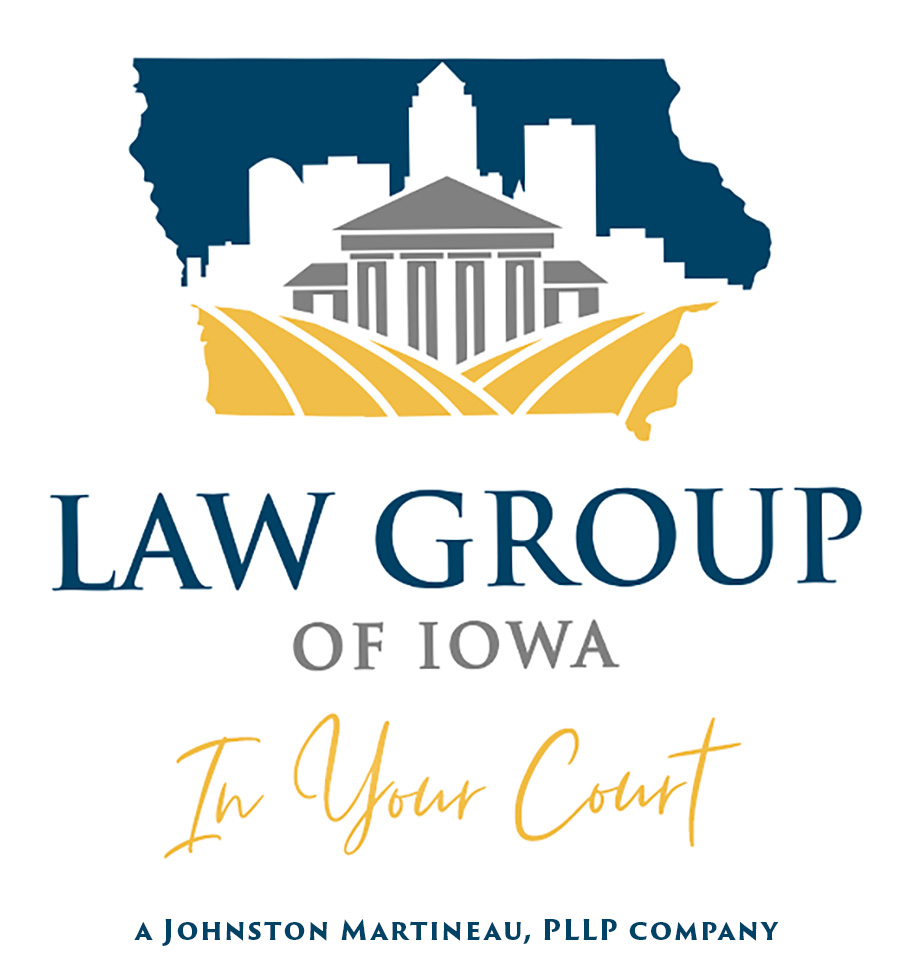Professional Legal Assistance You Can Trust
Our Des Moines, IA trust lawyer can be an invaluable partner in securing your financial legacy. If you have questions about trusts or need assistance with trust creation, management, or administration, don’t hesitate to reach out to our experienced team of legal professionals. Attorney Christopher Johnson is one of our founding partners and works hard to protect the rights of his fellow Iowans. Contact Law Group of Iowa for more information on how you can safeguard your assets and provide for your loved ones.

Table of Contents
Set Up Inheritance
When you pass away, you can dictate at what point your beneficiaries get their inheritance. If you do not specify, legal issues can ensue. If you want your beneficiaries to receive their inheritance at a particular time, you must say so. We can make sure the estate follows your wishes. It is valuable when you have a child with special needs as well. You can make certain they have special care. This point is essential when you have a child or family member with special needs and are unsure if someone else can care for them. Consulting with our Des Moines trust lawyer can put your mind at ease.
Experienced And Personalized Advice
If you do not know how to set up a trust, we can advise you. You must understand legal terms so you and your family can get benefits. Our trust and wills lawyer can assist with this and make sure no issues arise when writing wills or other documents. If your directions are complicated, our lawyer can verify that those carrying out your last wishes understand what you want. A trust is usually more flexible than a will, so keep this in mind when consulting with our lawyer.
Large estates that are particularly complicated can be confusing for you. Sound legal advice is essential when thinking about your family and estate. If you do not have a trust or clear directions about what to do with your money, your family could end up in probate court.
You can also receive advice about how to fund the trust. If you are unsure about where the money will come from or how your beneficiaries will get it, our attorney can help. While hiring our attorney does come with a fee, confirming your documents are clear and legally binding is necessary.
The Difference Between Wills And Trusts
You might have heard of wills before, and if you’ve planned for the future, chances are you’ve already looked into how a will can provide for your family after you pass away. However, while planning, you may have encountered another term – one that might not get as much attention in the public eye: Trusts. What are trusts, and what sets them apart from a will?
At their core, wills and trusts perform largely similar functions. It’s even possible for an individual to have both a will and a trust. While both wills and trusts are meant to make sure your estate is properly divided when you die, there are a few important differences to keep in mind. What you learn may help you decide how best to plan your estate.
Wills
A will is a list of assets and beneficiaries. The contents of a will can be divided up between your family, friends, and pretty much anyone else named in the will. However, wills can be a little complicated when it comes to execution. A will is available on public records – it’s nowhere near as private as a trust – and a will also means probate court.
Probate is the legal proceeding in which your assets and debts are distributed across your beneficiaries: While you might hope it goes smoothly, it’s oftentimes a very contentious process. There may be some bad blood between your beneficiaries, or there may be some bitter arguing over who gets what. If you have some family members who might be a bit estranged, or particularly greedy ex-wives or ex-husbands, probate can become a major headache for everyone involved. Plus, it means estate taxes; your beneficiaries might not receive quite as much money as they (or you) hoped.
The main thing to keep in mind when considering a will is the ease of drafting a will versus the ease of execution. A will leaves some room for argument between your family members after you die but a will is generally easier than a trust to draft and maintain. Once a will is written up, it’s written up.
Trusts
Trusts are a little more complicated to maintain than their will counterparts. They’re also a bit more expensive to fill out. A trust requires active management after it’s created, because (unlike a will) it becomes active the moment it’s completed. (A will is only active after you die).
However, trusts have plenty of upsides, too. Unlike a will, a trust names a third party to handle your estate once you die. This means no probate court, and it’s a good way to avoid potential conflict between family, friends, and any other beneficiaries. A trust assigns assets to beneficiaries, and those terms are set in stone: a trust is uncontestable. A trust can also get around estate taxes, which means more of your money goes to the intended recipients upon your death.
Unlike a will, which is easy to draft but difficult to execute, a trust is the opposite. A trust requires active management, but after you die, there’s little room for argument and bitterness. Our Des Moines trust lawyer can support you through all aspects of creating and managing trusts.
Setting Up A Trust
- Start By Getting Help
If you’ve never used a trust before, you should start by getting legal counsel. You can contact our lawyer or use an online service to help you get started. If you feel comfortable enough with the ins and outs of building a trust, you are legally allowed to open one on your own.
- Create Your Official Trust Document
You need an official trust document to outline the many different facets of your trust. This document should clearly define your grantor, your assets, any beneficiaries who might receive these assets, the trustee in charge of your trust, and any successors who might take over if your trustee becomes unavailable. You may also want to create a certificate of trust, which proves the existence of your trust and the validity of those involved with it.
- Sign Your Trust
Your trust is not considered legally binding until it bears your signature as well as those of two uninvolved witnesses. Not every state requires a trust to be notarized, but it’s always a good idea to do so. Having the document notarized can prove the validity of your trust and prevent instances of fraud.
- Set Up A Trust Fund Account
The next most important step is to set up a trust fund bank account. This is the account that provides money to any of your beneficiaries; it’s best to start with a brand-new bank account, but you may be able to register an existing bank account to this trust depending on the institution you’re going through.
- Move Your Assets
Once your trust has been established and notarized, you’ll want to make sure your assets are included in it. This applies to asset titles for vehicles, property deeds, and certificates of ownership to heirlooms or other valuable possessions. If you experience any major life changes or obtain new assets, you should update your trust accordingly.
- Designate Beneficiaries
After you’ve included all your assets in your trust, you’ll want to name some beneficiaries to receive them if anything happens to you. These assets are considered payable on death, so your beneficiaries will have access to your trust without the need for probate. If you’re not sure what probate is, the Law Group of Iowa can help.
Planning your estate can be a challenging and complicated experience, especially if you’re taking the steps to make things easier for your beneficiaries by putting together a trust. While it’s possible to write your own trust, it can be hard to do without legal guidance. Fortunately, we understand the importance of proper estate planning, and we’re happy to help you decide how best to plan for your future.
Des Moines Trust Infographic
Des Moines Trust Statistics
According to a survey conducted by Caring.com, even though 56 percent of Americans believe estate planning is important, only 33 percent have taken the steps to have end-of-life plans put in place. In one year, 75 percent of those plans included wills, 20 percent were trusts, and 6 percent were the naming of guardians for minor children.
Des Moines Trust FAQs
It is always important to know what you are dealing with before paying for a service. Continue reading to learn more about what trust lawyers can do and how they could help you!
Why Would I Need A Trust Lawyer?
You may need our trust lawyer for several reasons. First, if you have substantial assets that you wish to protect and manage for the benefit of your loved ones or charitable organizations, a trust can be an effective tool. Our lawyer can help you understand the confusing legal requirements and customize the trust to meet your specific needs.
Second, if you want to make sure that your assets are distributed according to your wishes after your passing, our trust and estate planning attorney can help you draft a comprehensive trust document. This document will specify how your assets should be distributed and managed, potentially avoiding disputes among your heirs in the future.
Finally, if you have been appointed as a trustee or are the beneficiary of a trust, our lawyer can provide guidance on your legal responsibilities, rights, and options. We can help you manage the trust administration and make sure that the trust operates smoothly.
What Types Of Trusts Can A Trust Lawyer Assist With?
Trust lawyers can assist with various types of trusts, including revocable living trusts, irrevocable trusts, testamentary trusts, special needs trusts, and charitable trusts, among others. Each type of trust serves different purposes, and our attorney can help you determine which one is most suitable for your specific circumstances.
How Can A Trust Lawyer Help With Trust Administration?
Trust lawyers can assist with various types of trusts, including revocable living trusts, irrevocable trusts, testamentary trusts, special needs trusts, and charitable trusts, among others. Each type of trust serves different purposes and our lawyer can help you determine which one is most suitable for your specific circumstances.
What Should I Consider When Choosing A Trust Lawyer?
When selecting a trust lawyer, it’s essential to consider their experience, knowledge in trust law, and a track record of success. Additionally, you should feel comfortable discussing your financial and personal matters with them, as trust matters can be highly personal and sensitive.
How Much Does Hiring A Trust Lawyer Cost?
The cost of hiring a trust attorney can vary based on factors such as the details of the trust, your location, and the lawyer’s experience. It’s advisable to discuss fees and payment structures with your chosen trust lawyer upfront for transparency and clarity regarding costs. We would be happy to set up a consultation to go over your budget to determine what kind of services would be best for you.
How Do I Get Started With A Trust Lawyer?
To get started with our trust lawyers, you can schedule an initial consultation. During this meeting, you can discuss your specific goals and needs with our lawyer, and we can provide guidance on the best course of action. It’s important to gather relevant financial information and documents to share with our lawyer during this process.
Des Moines Trust Glossary
At Law Group of Iowa, our full-service Des Moines, IA trust lawyer helps clients understand how trusts function in estate planning, asset protection, and financial management. Trusts offer a structured way to manage and distribute assets, providing long-term security and compliance with the wishes of the settlor while providing legal safeguards for the beneficiaries.
Trustee
A trustee is an individual or legal entity, such as a bank or trust company, responsible for managing and administering a trust following its terms. The trustee holds legal title to the trust assets and has a fiduciary duty to act in the best interest of the beneficiaries. These fiduciary duties include the duty of loyalty, which requires the trustee to prioritize the beneficiaries’ interests over their own, the duty of care, which makes sure that trust assets are managed prudently, and the duty to account, which mandates financial transparency. Trustees may be individuals, often family members or close associates of the settlor, or corporate entities that offer professional trust management. If a trustee fails in their responsibilities, they may be held legally accountable for a breach of fiduciary duty, which could result in legal penalties or their removal from the position.
Beneficiary
A beneficiary is the person or entity designated to receive benefits from the trust. Beneficiaries can take different forms, including primary beneficiaries, who are the main individuals entitled to the trust’s assets or income, and contingent beneficiaries, who receive benefits only if the primary beneficiary cannot (such as in the event of their passing). Additionally, income beneficiaries are entitled to receive only the income generated from trust assets, whereas remainder beneficiaries will receive the trust’s principal assets after a specified time or after certain conditions are met, such as the passing of another beneficiary. The rights of beneficiaries depend on the type of trust and the specific provisions outlined in the trust agreement.
Settlor
The settlor, also known as the grantor or trustor, is the individual who creates the trust by transferring assets into it. The settlor establishes the terms of the trust, including appointing the trustee and naming the beneficiaries. Depending on the type of trust, the settlor may retain certain powers, such as the ability to amend or revoke the trust in the case of a revocable trust. However, in an irrevocable trust, the settlor relinquishes control over the assets once they are placed in the trust, making the terms unchangeable without beneficiary or court approval. This structure often provides tax advantages and asset protection benefits, making irrevocable trusts a popular choice for estate planning.
Fiduciary Duty
A fiduciary duty is a legal obligation that requires one party to act in the best interest of another. In the context of trusts, the trustee has a fiduciary duty to the beneficiaries, ensuring that trust assets are managed prudently, distributed according to the trust’s terms, and protected from unnecessary risks. This duty extends to maintaining accurate records, providing periodic financial reports, and avoiding conflicts of interest. According to our Des Moines trust lawyer, a breach of fiduciary duty can result in legal action against the trustee, including financial restitution or removal from their role.
Irrevocable Trust
An irrevocable trust is a type of trust that, once established, cannot be altered, amended, or terminated by the settlor. This means that the settlor permanently gives up control over the assets placed in the trust, ensuring they are managed strictly according to the trust’s terms. The primary benefits of an irrevocable trust include asset protection from creditors, potential tax advantages, and estate planning benefits such as reducing estate tax liability. Our experienced Des Moines estate planning lawyer understands these trusts are commonly used for Medicaid planning, charitable giving, and protecting assets for future generations. However, since they are legally binding and difficult to modify, irrevocable trusts require careful planning and consideration before implementation.
Law Group of Iowa, Des Moines Trust Lawyer
5601 Hickman Rd., Suite 3B, Des Moines, IA., 50310
Contact Our Des Moines Trust Lawyer Today
Call or message us today to schedule a consultation with our Des Moines trust lawyer and take the first step toward safeguarding your assets and securing your legacy.
Client Review
“I had the pleasure of working with Attorney Jason Yates. He is very responsive, professional and knowledgeable. I trusted him completely to help me navigate my case, and the outcome was better than I had hoped for. I recommend him to anyone looking for good representation. Thank you Jason!” Libby Hennings




